|
November 2011 • Vol. 1 • Issue 4
From the Director's Desk
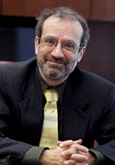 |
We are the change This has been a year of great achievement and change. U.S. News once again ranked Shands at UF among the top four percent of all cancer hospitals nationwide. This is in recognition that cancer care delivered by dedicated faculty and staff at UF&Shands results in our patients enjoying some of the best outcomes delivered by any hospital anywhere. I think we all take pride in this achievement.
Though we are among the nation's elite cancer hospitals in terms of quality cancer care, opportunities for positive change remain. We've invested heavily in state-of-the-art facilities and have hit the high mark in the delivery of quality patient care, now we must focus on how to improve the patient experience.
One significant transition we are negotiating in the effort to better serve our patients is the Patient Access Center, which is designed to provide a more streamlined and patient-friendly experience for those seeking access to care from UF&Shands. New staff has been hired and some members of the current staff have been reassigned and retrained to successfully achieve this enormous transition.
And finally, we know the nurse navigator model is vital to the continuum of cancer care leading to a five-star patient experience. We are committed to regaining momentum during the coming year through restructuring the nurse navigator program so that it serves most cancer disease types and is one under which everyone — patients, faculty and staff — will benefit and thrive.
Please join me in this effort as we become the change we wish to see, and thank you for all you do.
Best,
Paul Okunieff, M.D.
Director, UF Shands Cancer Center;
Chair, UF Department of Radiation Oncology;
Marshall E. Rinker Sr. Foundation and David B. and Leighan R. Rinker Chair |
Oncology Kudos

|
|
Nancy P. Mendenhall, M.D.
|
|
Mendenhall named to James E. Lockwood Professorship
Nancy P. Mendenhall, M.D., medical director of the University of Florida Proton Therapy Institute and associate chair of the UF department of radiation oncology, is the recipient of a James E. Lockwood Professorship.
The newly created professorship is made possible by a $1 million endowment from the Lockwood Charitable Foundation and is the first of two $1 million professorships that will be announced by the Foundation for Proton Therapy. Mendenhall formally accepted the professorship during a "Celebrating Distinction" ceremony at the UF Health Science Center campus in Gainesville.
Read more
|

|
|
Mark T. Scarborough, M.D.
|
|
Scarborough to head orthopaedics department at UF College of Medicine
Mark T. Scarborough, M.D., has been named chairman of the department of orthopaedics and rehabilitation in the University of Florida College of Medicine. Scarborough, an orthopaedic oncologist, has been on the UF faculty for 20 years. He has also been named as the first holder of the William F. Enneking, William E. Anspach, and Orthopaedic Alumni endowed chair.
Read more
|
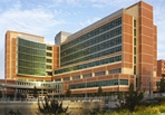
|
| Shands Cancer Hospital |
|
U.S. News ranks Shands at UF among nation's best hospitals
Seven medical specialty programs at Shands at the University of Florida are recognized among the nation's best in the 2011-2012 U.S. News & World Report's Best Hospitals rankings, which were released July 19.
Shands at UF was ranked at No. 35 nationally, and is among the top four percent of all cancer hospitals ranked nationwide.
Read more |
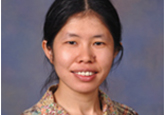
|
| Mei Zhang, M.D. |
|
Zhang honored with Knisely Award
Mei Zhang, M.D., an assistant scientist in the department of radiation oncology, received the Knisely Award from the International Society on Oxygen Transport to Tissue. Established in 1983 in honor of Melvin H. Knisely, the award seeks to recognize outstanding young investigators in a variety of disciplines. The award includes a Melvin H. Knisely plaque and a cash prize. |

|
| International Journal of Radiation Oncology, Biology, Physics |
|
Dai, Bae and Siemann Highlighted in International Journal of Radiation Oncology
Yao Dai, Ph.D, a post doctoral research associate of radiation oncology, Dietmar W. Siemann, Ph.D., professor and associate chair of the department of radiation oncology, and Kyungmi Bae, Ph.D., a post doctoral associate with the department of urology, are highlighted in the October issue of International Journal of Radiation Oncology for their study, "Impact of Hypoxia on the Metastatic Potential of Human Prostate Cancer Cells."
The study examined the effect of acute and chronic hypoxia on the metastatic potential of prostate cancer cells. They concluded that the length of oxygen deprivation strongly affected the functional behavior of all three prostate cancer cell lines. Acute hypoxia in particular was found to promote a more aggressive metastatic phenotype.
|
In The News
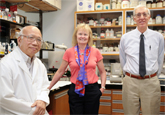
|
| Chingkuang Tu, Ph.D., Susan Frost, Ph.D., and David N. Silverman, Ph.D. |
|
UF researchers show new way to target tumor cells
Whether a tumor flourishes or dies depends, to an extent, on the acidity of the environment in which it lives, and a certain enzyme plays a key role in that balance, according to new research from the University of Florida.
An enzyme known as carbonic anhydrase IX ("carbonic anhydrase nine") influences tumor biology by working to keep acidity — or pH — at a level at which normal cells perish, but cancer cells thrive.
"We don't know why cancer cells can tolerate low pH — but they do, and we believe that carbonic anhydrase is a significant player in picking the specific pH at which the cells are happiest," said biochemist Susan Frost, Ph.D., of the UF Shands Cancer Center, who led the research team.
Read more |

|
| Johannes W. Vieweg, M.D., F.A.C.S. |
|
UF Prostate Disease Center leads charge for new state prostate disease program
In Florida, one in four men will be diagnosed with prostate cancer, according to experts from the University of Florida department of urology and Prostate Disease Center.
But new legislation that took effect in July aims to change these statistics with the establishment of a state of Florida Prostate Cancer Awareness Program, coordinated through the UF Prostate Disease Center. The program will bring together experts and leaders from across the state to tackle prostate cancer, the most commonly diagnosed cancer in the state, according to the Department of Health.
Read more |
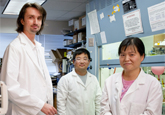
|
| Hendrik Luesch, Ph.D., Qi-Yin Chen, Ph.D., and Yanxia Liu, Ph.D. |
|
UF medicinal chemists modify sea bacteria byproduct for use as potential cancer drug
University of Florida researchers have modified a toxic chemical produced by tiny marine microbes and successfully deployed it against laboratory models of colon cancer.
Writing in a recent issue of ACS Medicinal Chemistry Letters, UF medicinal chemists describe how they took a generally lethal byproduct of marine cyanobacteria and made it more specifically toxic — to cancer cells.
Read more
|
Research
UFSCC Triple Negative Breast Cancer Research Grant Awardees
Triple Negative Breast Cancer (TNBC) — defined as estrogen receptor, progesterone receptor and human epidermal growth factor receptor type 2 (HER2) negativity — is heterogeneous with respect to biology, prognosis and response to treatment. TNBC is associated with younger age at diagnosis and with poorer outcomes compared with non-TNBC. Studies to enhance our understanding of TNBC are needed to improve our understanding of its biology and current management and outcome of patients diagnosed with TNBC.
This funding opportunity was made available through a generous philanthropic donation to the UF Shands Cancer Center by the Collaboration of Scientists for Critical Research in Biomedicine (CSCRB, Inc.) and the Jerry W. and Judith S. Davis Cancer Research Endowment. It recognizes that the study of TNBC is underrepresented in academic and industry research portfolios, and that there exists a great need to advance our understanding of the genetics and biology of TNBC and for implementing new strategies for clinical trials.
We are very pleased to announce that grants have been awarded to the following researchers:
Robert Hromas, M.D., professor and chair, department of medicine, for his application titled, "The addiction of triple negative breast cancer cells to metnase."
Susan Frost, Ph.D., professor, department of biochemistry and molecular biology, for her application titled, "Carbonic anhydrase and pH control in breast cancer cells."
|
UFSCC Small Cell Lung Cancer Research Grant Awardees
Small Cell Lung Cancer is an aggressive subtype of lung cancer that exhibits a unique clinical, pathological, and biological phenotype.
This funding opportunity, made available through a generous philanthropic donation to the UF Shands Cancer Center, recognizes that the study of neuroendocrine small cell lung cancer is underrepresented in academic and industry lung cancer research portfolios, and there exists a great need to advance our understanding of the genetics and biology of small cell lung cancer and for implementing new strategies for clinical trials.
We are very pleased to announce that grants have been awarded to the following researchers:
Lung-Ji Chang, Ph.D., professor, department of chemistry, for his application titled, "Immunotherapy targeting small cell lung cancer."
Michael Jantz, M.D., associate professor, department of medicine, for his application titled, "Bronchoscopic Intratumoral Chemotherapy for Small Cell Lung Cancer."
David Reisman, M.D., Ph.D., associate professor, department of medicine, for his application titled, "Determining if BRM Promoter Polymorphisms can Predict Small Cell Lung Cancer Risk."
Weihong Tan, Ph.D., professor, departmentt of chemistry for his application titled, "Small Cell Lung Cancer Therapy Using Targeted Radiation Along With Chemotherapy & Use of Aptamers to Detect Small Cell Lung Cancer in Peripheral Blood."
Maria Zajac Kaye, Ph.D., associate professor, department of anatomy and cell biology, for her application titled, "Optimizing a Genetically Engineered SCLC Mouse Model to Discover New Insights into Molecular Mechanisms and Test Novel Targeted Therapies."
Steven Zhang, Ph.D., research assistant professor, department of radiation oncology, for his application titled, "Metal-regulatory Transcription Factor 1 (MTF 1) Role in Small Cell Lung Cancer." |
Clinical Trials
A Phase I Clinical Trial of OXi4503 for Relapsed and Refractory Acute Myelogenous Leukemia (AML) and Myelodysplastic Syndromes (MDS)
This study is intended to determine the safety and maximum tolerated dose of a drug, OXi4503 (combretastatin A1 diphosphate, CA1P, OXiGENE), in patients with relapsed and refractory AML and MDS. Protocol No. 145-2010.
Principal Investigator: Christopher R. Cogle.
|
Daunorubicin, Cytarabine, and Midostaurin in Treating Newly Diagnosed Acute Myeloid Leukemia
Drugs used in chemotherapy, such as daunorubicin and cytarabine, work in different ways to stop the growth of cancer cells, either by killing the cells or by stopping them from dividing. Midostaurin may help daunorubicin and cytarabine work better by making cancer cells more sensitive to the drugs. Midostaurin also may stop the growth of cancer cells by blocking some of the enzymes needed for cell growth.
It is not yet known whether combination chemotherapy is more effective with or without midostaurin in treating acute myeloid leukemia.
This randomized phase III trial is studying giving daunorubicin and cytarabine with or without midostaurin followed by high-dose cytarabine and midostaurin to see how well it works in treating patients with newly diagnosed acute myeloid leukemia.Protocol No. 187-2009.
Principal Investigator: Jack W. Hsu.
|
PROLONG: Phase III Trial in Relapsed CLL Of a MonocLonal Antibody Ofatumumab mainteNance therapy to delay proGression vs observation
The purpose of this study is to determine if maintenance therapy with ofatumumab will prolong remission in patients with CLL who have responded to second or third line treatment. This study will also evaluate the safety of ofatumumab maintenance compared to observation (the current standard of care). This study was co-developed with the HOVON and NORDIC CLL group and will be conducted as a collaborative effort with GSK. Protocol No. 20091699. Principal Investigator: Nam H. Dang. |
Study Evaluating Chemotherapy in Combination With Inotuzumab Ozogamicin In Subjects With NHL
This is a phase 1 trial designed to evaluate safety and tolerability of chemotherapy in combination with inotuzumab ozogamicin, an investigational product, in adults with CD22-positive non-Hodgkin's lymphoma. The trial will involve two arms. In one arm, subjects will receive chemotherapy regimen R-CVP (rituximab, cyclophosphamide, vincristine and prednisone). In the other arm, subjects will receive R-GDP (rituximab, gemcitabine, cisplatinum and dexamethasone). Subjects in both arms will also receive inotuzumab ozogamicin. Protocol No. 20092016.
Principal Investigator: Nam H. Dang. |
A Phase III Study of Chemotherapy and Chemoradiotherapy With or Without HyperAcute®-Pancreatic Cancer Vaccine in Subjects with Surgically Resected Pancreatic Cancer
The object of this trial is to assess overall survival after treatment with a regimen of adjuvant therapy (Gemcitabine alone or with 5-FU chemoradiation) with or without HyperAcute®-Pancreatic Cancer Vaccine in subjects who have undergone surgical resection. Protocol No. 20100711. Principal Investigator: Thomas J. George Jr.
|
An Open-Label, Multicenter, Randomized, Phase III Study to Investigate the Efficacy and Safety of Bendamustine Compared With Bendamustine+RO5072759 (GA101) in Patients With Rituximab-Refractory, Indolent Non-Hodgkin's Lymphoma
This is an open-label, multicenter, randomized, Phase III study to investigate the efficacy and safety of GA101 combined with bendamustine compared with bendamustine alone in patients with rituximab-refractory, indolent Non-Hodgkin's lymphoma (NHL). Protocol No. 20101075. Principal Investigator: James W. Lynch. |
A Phase 1b/2 Randomized Phase 2 Study Evaluating the Efficacy of Doxorubicin With or Without a Human Anti-PDGFRá Monoclonal Antibody (IMC-3G3) in the Treatment of Advanced Soft Tissue Sarcoma
Phase 1b: The primary objective of this portion of the study is to evaluate the safety profile of IMC-3G3 when administered in combination with doxorubicin to patients with advanced soft tissue sarcoma (STS) not amenable to treatment with surgery or radiotherapy. Phase 2: The primary objective of this portion of this study is to compare the progression-free survival (PFS) in patients with advanced STS not amenable to treatment with surgery or radiotherapy when treated with IMC-3G3 in combination with doxorubicin versus doxorubicin alone. Protocol No 20101743. Principal Investigator: Long Dang.
|
A Phase II Clinical Trial of the CDK4/6 inhibitor, PD0332991 in Previously-Treated, Advanced NSCLC Patients With Wildtype RB and Inactivated CDKN2a
The purpose of this study is to determine the efficacy and the toxicities of the study drug PD0332991 in the treatment of patients with Stage IV non-small cell lung cancer with wildtype retinoblastoma protein (RB) and inactivated cyclin dependent kinase (CDK) N2A in the tumor. Protocol No. 643-2010. Principal Investigator: Priya K. Gopalan. |
A Phase III Clinical Trial Comparing the Combination of TC plus Bevacizumab to TC Alone and to TAC for Women with Node-Positive or High-Risk Node-Negative, HER2-Negative Breast Cancer.
The main purpose of this study is to learn if adding bevacizumab to standard treatment with chemotherapy (docetaxel, doxorubicin, and cyclophosphamide) for early stage HER2-negative breast cancer will prevent breast cancer from returning. A second purpose of this study is to learn if adding bevacizumab to treatment with chemotherapy will help women with HER2-negative breast cancer live longer. The researchers also want to learn about the side effects of the combination of drugs used in this study. Protocol No. 705-2009. Principal Investigator: Stephen P. Staal.
|
|
Mark Your Calendar!
Grand Rounds
Jeremy M. Stark, Ph.D.,
Associate Professor
Division of Radiation Biology
Beckman Research Institute of the City of Hope, Duarte, Calif.
"Factors and Pathways that Influence Mammalian Chromosomal Instability"
Nov. 9, noon,
Rooms 1204/1205,
Shands Cancer Hospital at UF
For more info, email Terry Murphy
Veterans Day Holiday!
Nov. 11
Topics Seminar Series
Mansour Mohamadzadeh, Ph.D., Professor
IFAS - Veterinary Medicine
Dept of Pathobiology
University of Florida
"Reprogramming intestinal immunity is the answer to pathogenic inflammation"
Nov. 18, 9 a.m.,
Room 451A/B,
Cancer & Genetics Research Complex
For more info, email Terry Murphy
Thanksgiving Holiday!
Nov. 24 & 25, Happy Turkey Day!
Contact Us
Do you have a great story, or have you been honored with an award or had research accepted for publication? Let us know! We'll include it in the Cancer Connection eNews, which is distributed monthly to UF Shands Cancer Center members and the faculty and staff of the center's multidisciplinary cancer programs during the fall and spring semesters. Send your news to:
Lindy Brounley
Communications Director
UF Shands Cancer Center
Phone: 352-273-8013
E-mail: brounley@ufl.edu

|